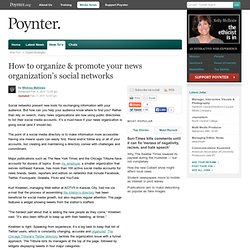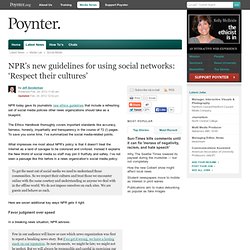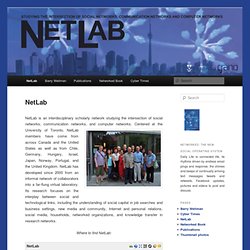

How to apply our standards to our journalism. How to organize & promote your news organization’s social networks. Social networks present new tools for exchanging information with your audience.

But how can you help your audience know where to find you? Rather than rely on search, many news organizations are now using public directories to list their social media accounts. It’s a must-have if your news organization is going social (and it should be). The point of a social media directory is to make information more accessible. Having one means users can easily find, friend and/or follow any or all of your accounts, but creating and maintaining a directory comes with challenges and commitment. Kurt Kloeblen, managing Web editor at KCTV5 in Kansas City, told me via e-mail that the process of assembling the station’s directory has been beneficial for social media growth, but also requires regular attention.
“The hardest part about that is adding the new people as they come,” Kloeblen said. Kloeblen is right. Publicizing your directory can help users find it — and know that it exists. NPR’s new guidelines for using social networks: ‘Respect their cultures’ NPR today gave its journalists new ethics guidelines that include a refreshing set of social media policies other news organizations should take as a blueprint.

The Ethics Handbook thoroughly covers important standards like accuracy, fairness, honesty, impartiality and transparency in the course of 72 (!) Pages. To save you some time, I’ve summarized the social media-related points. What impresses me most about NPR’s policy is that it doesn’t treat the Internet as a land of savages to be colonized and civilized. Instead it explains the New World of social media so staff may join it fruitfully and safely. To get the most out of social media we need to understand those communities. Here are seven additional key ways NPR gets it right. Favor judgment over speed In a breaking news situation, NPR advises: Few in our audience will know or care which news organization was first to report a breaking news story. Don’t let your guard down Don’t just “spread information” Here’s the elaboration:
Wp-content/uploads/2011/08/Twitter_Sports_Marketing_Guide.pdf. Society for New Communications Research.
Articles. Strategy. TNS - Mobile Life. Www.worldrowing.com Facebook Statistics. Noow is a Media Player Downloads and Plays Music and Video for You. An Introduction to Networks in the Global Village. NetLab is an interdisciplinary scholarly network studying the intersection of social networks, communication networks, and computer networks.

Centered at the University of Toronto, NetLab members have come from across Canada and the United States as well as from Chile, Germany, Hungary, Israel, Japan, Norway, Portugal, and the United Kingdom. NetLab has developed since 2000 from an informal network of collaborators into a far-flung virtual laboratory. Its research focuses on the interplay between social and technological links, including the understanding of social capital in job searches and business settings, new media and community, Internet and personal relations, social media, households, networked organizations, and knowledge transfer in research networks. Where to find NetLab: NetLab43.665016, -79.399325NetLabUniversity of TorontoiSchool140 St. Social Media Revolution.